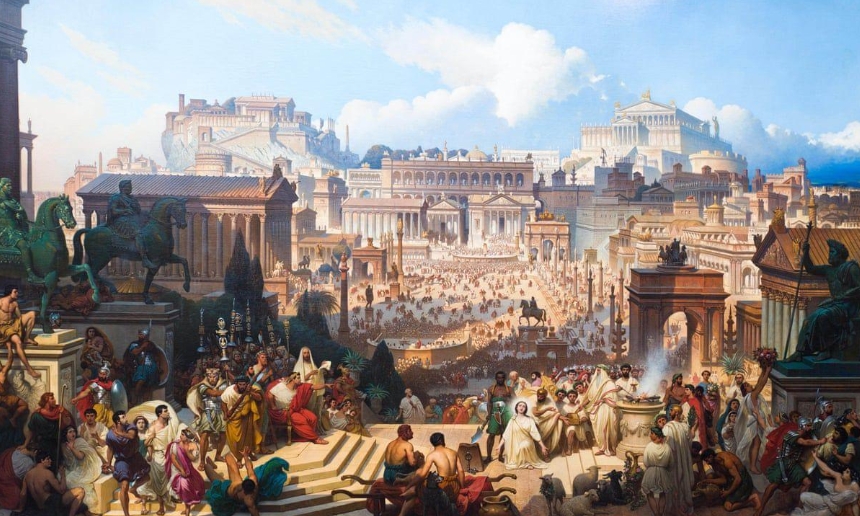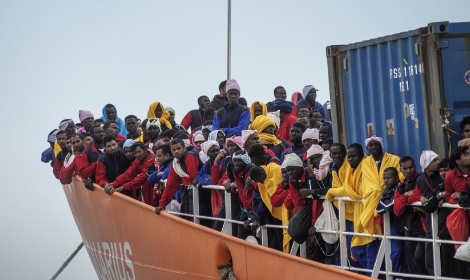为什么罗马帝国从未向西探索新大陆,或者绕过非洲到亚洲,即使他们财富丰厚,能够资助大规模的海上探险?
正文翻译


评论翻译
Colin Riegels
The Romans were not so much explorers as conquerors. Hence they tended to take an incremental approach to expansionism. They tended to try and conquer whatever people they found next, rather than taking a holistic look at the globe and thinking where they might like to go next.
罗马人更多地是征服者,而不是探险家。因此,他们倾向于采取逐步扩张的方法。他们倾向于试图征服他们下一个发现的任何人,而不是全球一揽子地考虑他们下一步可能想去的地方。
New World. Whilst it is true they never tried to cross the Atlantic, it is highly unlikely that ships of that time could have survived the crossing. And of course, even if they could, they would have no idea how long they would have to sail in terms of provisioning, nor at what point they should give up and return if they didn’t find land.
新大陆。尽管他们从未尝试横渡大西洋,但当时的船只极有可能无法经受住这样的航行。当然,即使能够,他们也不知道在粮食供应方面需要航行多长时间,也不知道如果他们找不到陆地时应该何时放弃返回。
However the others are not true. They did push into Asia and into Africa with differing results.
然而,其他说法并不正确。他们确实向亚洲和非洲推进,但结果各不相同。
Africa (1). There are at least two known groups of Roman campaigns into Africa. The first (and far more complex) was the Roman push down into modern day Sudan from Egypt. The Romans encountered the Kush, and - as was common - a protracted period of warfare occurred. Although the Romans were able to defeat the Kush on the battlefield, projecting war at a distance was difficult and eventually the Romans gave up and went ‘home’.[1] (Side note: during this period the African Kush people were lead by a warrior Queen - how has Hollywood not made a movie about this yet?)
非洲(1)。至少有两组已知的罗马入侵非洲的活动。第一组(也更加复杂)是罗马人从埃及向现代苏丹南部推进。罗马人遭遇了库什人,并且 - 正如通常所见 - 发生了一段漫长的战争时期。尽管罗马人能够在战场上击败库什人,但远距离作战是困难的,最终罗马人放弃了并返回了“家园”。(副注意:在这个时期,非洲库什人由一位女战士女王领导 - 好莱坞为什么还没有拍摄一部关于这个的电影?)
Africa (2). The second groups was a series of exploratory expeditions south across the Sahara from what is roughly modern day Morocco and Libya.[2] Now, the Sahara was not quite so fearsome back then as it is today (there were a number of trading towns along the way), but it was still a difficult crossing. However, although these expeditions brought African artefacts back (and left Roman artefacts in place), none of the reports led Roman leaders of the various times to believe that a difficult and costly trans-Saharan expedition should be mounted to expand the reach of the Empire.
非洲(2)。第二组是一系列从大约现代摩洛哥和利比亚地区向南穿越撒哈拉沙漠的探险远征。现在,撒哈拉沙漠并不像今天那样可怕(沿途有许多贸易城镇),但仍然是一次艰难的穿越。然而,尽管这些远征带回了非洲的文物(并留下了罗马的文物),但这些报告都没有使当时的罗马领导相信应该进行一次艰难而代价高昂的跨撒哈拉远征以扩大帝国的影响力。
Asia. Asia is easier. Why didn’t the Romans expand into Asia? Short answer: they did. At least, they did until they were stopped. The further they got from Rome, the harder things got. In particular the Battle of Ctesiphon in 363 AD was a critical turning point, which showed the limits of the ability of the Romans to project power over large distances into Asia.[3] Unlike Africa, the Romans were actually interested in continued conquest and expansion into Asia for its wealth. But ultimately their ability to continually expand and project power at distance reached its natural limits, and they suffered some stinging defeats.
亚洲。亚洲就比较容易理解了。为什么罗马人没有向亚洲扩张?简短回答:他们确实这样做了。至少,在他们被阻止之前是这样。他们离开罗马越远,事情就越难。特别是公元363年的泰西封战役是一个关键转折点,显示了罗马人在向亚洲大范围投射权力方面的能力的局限性。与非洲不同,罗马人实际上对继续征服和扩张亚洲的财富感兴趣。但最终,他们不断扩张和远程投射权力的能力达到了自然限制,并遭受了一些沉重的失败。
Patrick S
The Roman Empire, with its vast wealth and resources, undoubtedly had the means to undertake great naval expeditions. So why didn’t they explore west to the New World or around Africa to Asia? While we can never know for certain, several factors likely contributed to their lack of exploration in these directions.
罗马帝国拥有丰富的财富和资源,无疑有能力进行伟大的海上远征。那么为什么他们不向西探索新大陆,或者绕过非洲去亚洲呢?虽然我们永远无法确定,但有几个因素可能导致他们在这些方向上缺乏探索。
Firstly, it’s important to understand that the Romans had a different perspective on the world compared to later European explorers. Their focus was primarily on expanding their empire, consolidating power, and ensuring economic prosperity through trade. Unlike the later Age of Discovery, which was driven by a thirst for new knowledge and exploration, the Romans were content with their existing territories and trading routes.
首先,重要的是要理解罗马人对世界的看法与后来的欧洲探险家不同。他们的重点主要是扩张他们的帝国、巩固权力,并通过贸易确保经济繁荣。与后来的大发现时代不同,后者被对新知识和探索的渴望驱使,罗马人对现有的领土和贸易路线感到满足。
Secondly, the geographical knowledge of the Romans was limited. The Romans were aware of lands to the east, such as India and China, which they called Seres and Sinae respectively. However, their understanding of the world beyond these territories was hazy at best. The concept of sailing west across the vast Atlantic Ocean to discover a whole new continent simply did not exist in their collective consciousness.
其次,罗马人的地理知识有限。罗马人知道东方的陆地,比如印度和中国,他们分别称之为Seres和Sinae。然而,他们对这些领土以外的世界的理解最多也只是模糊的。横渡广阔的大西洋,发现一个全新的大陆的概念在他们的集体意识中根本不存在。
Moreover, the Romans had different priorities. The empire faced numerous challenges, both internally and externally, throughout its existence. From dealing with political instability to defending against barbarian invasions, the Romans had their hands full with the management and maintenance of their vast empire. These pressing concerns likely took precedence over embarking on large-scale naval expeditions to explore unknown lands.
此外,罗马人有不同的优先事项。帝国在其存在的整个历史中面临着许多挑战,无论是内部的还是外部的。从处理政治不稳定到抵御蛮族入侵,罗马人忙于管理和维护他们广阔帝国的事务。这些紧迫的问题可能比进行大规模海上远征探索未知土地更为重要。
Additionally, the Roman Empire had a flourishing trade network that spanned from the British Isles to the Middle East. They had established maritime trade routes in the Mediterranean, Red Sea, and Indian Ocean, which allowed them to import valuable goods like spices, silk, and precious metals. With such lucrative trade already established, there may have been little incentive for the Romans to venture into uncharted waters.
此外,罗马帝国有着繁荣的贸易网络,覆盖从不列颠群岛到中东的地区。他们在地中海、红海和印度洋建立了海上贸易路线,这使他们能够进口香料、丝绸和贵金属等有价值的商品。有了这样的利润丰厚的贸易,罗马人可能没有动力去冒险涉足未知的领域。
Furthermore, the Roman Navy, though formidable, was primarily built for military purposes rather than exploration. Its primary function was to protect the empire’s maritime interests and secure trade routes, rather than to embark on grand voyages of discovery.
此外,罗马海军虽然强大,但主要是为了军事目的而建立的,而不是为了探索。它的主要功能是保护帝国的海上利益和确保贸易路线的安全,而不是进行宏伟的发现之旅。
Lastly, the Romans did engage in some limited exploration. For instance, they conducted expeditions along the coasts of Africa, reaching as far as modern-day Somalia. However, these exploratory ventures were often driven by specific obxtives, such as finding new trade partners or securing strategic locations, rather than a broader quest for discovery.
最后,罗马人确实进行了一些有限的探索。例如,他们沿着非洲海岸进行了一些探险,一直延伸到现代索马里。然而,这些探险性冒险通常是出于特定目标,如寻找新的贸易伙伴或确保战略位置,而不是为了更广泛的探索之旅。
As I conclude, while the Roman Empire possessed immense wealth and naval capabilities, several factors help explain why they did not explore west to the New World or around Africa to Asia. These include their different perspective on the world, limited geographical knowledge, competing priorities, a flourishing trade network, and a navy primarily geared towards military purposes. While their lack of exploration may seem curious to us today, it is important to view it within the context of the time and the Roman Empire’s unique set of circumstances.
总之,虽然罗马帝国拥有巨大的财富和海军能力,但有几个因素可以解释他们为什么不向西探索新大陆,或者绕过非洲去亚洲。这些因素包括他们对世界的不同看法、有限的地理知识、竞争性优先事项、繁荣的贸易网络以及主要面向军事目的的海军。尽管他们的缺乏探索可能在今天看来令人好奇,但重要的是要将其置于当时的环境和罗马帝国独特的情况下加以考虑。
Roger Williams
Why would they? The Romans were not explorers. The Roman Empire used conquest strategically, not because they were simply curious about what’s just beyond the horizon. Every part of the Empire was part of it because it served some purpose - if only to keep cities or some other resource out of the hands of potential rivals. But that’s about it. What lay beyond the Sahara? Who really cared? The known world itself was more than big enough to satisfy the needs of the Romans for wealth and resources. and it was work enough to protect and develop the empire they had without gambling on trying to conquer the completely unknown, let alone develop a navy that could go long distances.
The idea would simply seem impractical to the Roman mind.
为什么要这样做呢?罗马人不是探险家。罗马帝国战略性地利用征服,而不是因为他们对地平线之外的事物感到好奇。帝国的每一部分都是因为它有某种用途而被吞并的,哪怕只是为了防止城市或其他资源落入潜在竞争对手手中。但仅此而已。撒哈拉沙漠之外是什么?谁真的在乎呢?已知的世界本身就足够大,能够满足罗马人对财富和资源的需求。保护和发展他们已经拥有的帝国已经足够艰巨,更别提冒险征服完全未知的地区,更不用说发展一支能够远行的海军了。这种想法在罗马人的思维中似乎显得不切实际。
Andy Burns
The Romans weren’t comfortable blue-water sailors. Sailing in the open ocean is much different than sailing in the Mediterranean. And anyway, in a very general sense, the Romans were a more practical than curious people. While they were perfectly aware that the world was round, and that Han China was somewhere over the western horizon, they had no idea how far away it would be to the west, nor of the American landmass in the way.
罗马人并不适应远洋航行。在开阔的海洋中航行与在地中海中航行大不相同。而且,从非常一般的意义上讲,罗马人更注重实际而不是好奇。虽然他们完全意识到世界是圆的,而且汉朝中国就在西方地平线的某处,但他们不知道往西方有多远,也不知道途中是否有美洲大陆。
Simply put, the Romans were a naval power within the Mediterranean basin. There was no real purpose to maintaining a Navy outside the Straits, except to try and control piracy; there were no rival naval powers west of Gibraltar. There was no known practical purpose to going west over the horizon. While they certainly wondered what was out there, as far as they knew the most likely answer was nothing; or at least, nothing of any practical value. And sailing south along a disease-ridden coast, when there were established trade routes east, would have seemed ludicrous, not to mention probably fatal.
简而言之,罗马人是地中海盆地内的一支海军力量。在直布罗陀海峡之外维持一支海军没有真正的目的,除了试图控制海盗;在直布罗陀海峡以西并没有任何竞争对手的海军力量。往西方的地平线上没有已知的实际目的。虽然他们当然会好奇外面是什么,但就他们所知,最有可能的答案是什么也没有; 或者至少,没有任何实际价值的东西。而且,沿着疾病肆虐的海岸向南航行,当已经有了东方的建立的贸易路线时,这似乎是荒谬的,更不用说可能是致命的了。
Roy Boss
For two reasons
Firstly the Romans thought that in most areas they had reached the limits of the Known world. To the North lay cold winters and sparse population and savage tribes with no loot. To the South baking deserts and more savage dirt poor tribes. Only to the East were there lands with gold, art, populations to dominate. Unfortunately the first civilisation that would be met was the Parthian /Persian Empire and that was a tough nut to crack.
有两个原因。
首先,罗马人认为他们已经到达了已知世界的大多数地区的边界。向北是寒冷的冬季和稀疏的人口,还有野蛮部落,没有任何可掠夺的财富。向南则是炎热的沙漠和更加贫穷的野蛮部落。只有向东方有着黄金、艺术和可以统治的人口的土地。不幸的是,第一个遇到的文明是帕提亚/波斯帝国,而那是一个难啃的硬壳。
Secondly one of the dominant myths of Rome and thus of the Roman psyche was that of Alexander the Great. If you wanted to emulate the world’s greatest military hero ever ( and this was an appropriate imperial ambition ) then you emulated Alexander and conquered to the East. So emperors such as Trajan and Valerian and Julian headed in that direction to accumulate glory and mostly got a hard time from the Persians! Going around Africa might have happened on a small scale, but if you gotvaround the Sahara you only arrived at jungle , certainly nothing that Rome wanted and certainly no glory!
其次,罗马的主导神话之一,因此也是罗马心理的主导神话之一,就是亚历山大大帝的故事。如果你想效仿史上最伟大的军事英雄(这是一个适当的帝国抱负),那么你就要效仿亚历山大,往东征服。因此,像图拉真、瓦勒良和朱利安这样的皇帝都朝着东方前进,积累荣耀,但大多数时候都与波斯人打了一场艰苦的战斗!绕过非洲可能发生在小范围内,但如果你绕过撒哈拉沙漠,你只会抵达丛林,肯定不是罗马想要的,也肯定不会有荣耀!
Lynn Oddy
They didn’t have ocean going ships. Sailing round Spain in the Atlantic Ocean and the Bay of Biscay was a risky journey. So much so that to invade Britain they preferred to build a fleet in Northern France. The Mediterranean Sea is a lot calmer so ships could get away with being weaker. It was a nine hundred years later and from a different maritime tradition that the Scandinavians built ships that crossed the Atlantic and even then it involved sailing from Norway via Iceland and Greenland to get to North America. None of these places were known to the Romans.
他们没有远洋船只。在大西洋和比斯开湾环绕西班牙航行是一次危险的旅程。以至于为了入侵英国,他们宁愿在法国北部建立一支舰队。地中海要平静得多,所以船只可能会变得更弱。900年后,斯堪的纳维亚人从不同的航海传统中建造了横渡大西洋的船只,即使在那时,他们也要从挪威出发,经冰岛和格陵兰岛到达北美。这些地方罗马人都不知道。
Miguel Corazao
Well, the question is based on some false premises. Let me explain.
First, the notion that the Romans were explorers who wandered on expeditions to find new lands is utterly false. The Romans only traveled to known places where there was a clear benefit. The provinces they conquered were places that already had proven resources. So there would never have been a reason for them to want to set out across the Western ocean hoping to find new lands. That would be counter to everything they did.
好的,这个问题基于一些错误的前提。让我来解释一下。
首先,罗马人是探险家,四处远征以寻找新土地的观念是完全错误的。罗马人只前往已知的地方,那里有明确的利益。他们征服的省份是已经有可靠资源的地方。所以他们永远不会有理由想要横越西洋,希望找到新的土地。那与他们的一切做法相悖。
Regarding Asia, first many people forget that the Romans controlled Egypt and the Sinai. The Mediterranean is only separated from the Red Sea (and hence the Indian Ocean) by a small strip of land. Burdensome as it is to transport goods over that small strip of land, it is still a dramatically shorter trip than going around Africa. The Romans did in fact explore routes around Africa a little bit but quickly abandoned the idea as impractical given their relatively poor maritime technology.
关于亚洲,首先,很多人忘记了罗马人控制着埃及和西奈。地中海只是被一小片陆地与红海(因此与印度洋)分开。虽然通过这小片陆地运输货物是件麻烦事,但它仍然比绕过非洲要短得多。事实上,罗马人确实探索过非洲周围的路线,但很快就放弃了这个想法,因为他们的航海技术相对落后。
Neil Thurogood
Two answers: the first is that, generally, the Romans didn’t really value their navy as much as their legions. Even being an auxilliaryman was considered being better than a sailor. The Romans also weren’t particularly known for having great admirals either. Their great naval victory over Carthage involved reverse-engineering their enemy’s warships. They were also terribly superstitious and very nearly never invaded Britain because of this.
两个答案:第一个是,总的来说,罗马人并没有像对待他们的军团那样重视他们的海军。甚至成为辅助兵被认为比成为水手更好。罗马人也不以拥有伟大的海军将领而著称。他们对迦太基的伟大海战胜利涉及逆向工程敌人的战舰。他们也非常迷信,因此几乎从未入侵过英国。
Second answer: some people think they did! And there is evidence for this as, apparently, Roman vases have been discovered off the Brazilian coast. There is something of a conspiracy theory about this as, if this was proven to be true, it meant Italians not Portuguese have a claim to Brazil. There is also a mosaic with a picture of what looks to some people like a pineapple!
第二个答案是:有些人认为他们确实这样做了!而且有证据支持这一观点,因为据说在巴西海岸发现了罗马花瓶。关于这一点存在一些阴谋论,因为如果这被证实为真,意味着意大利人而不是葡萄牙人对巴西有主张权。还有一幅马赛克画上有一张被一些人认为像菠萝的图片!
David Johnson
They didn’t need to.
You have to understand what the driving force for exploring West was in the first place. It was all lixed to finding a way to Asia - and all the lovely money the spices there would bring - that went around the Islamic holdings in Asia Minor and the Middle East and their monopoly on those same spices.
他们不需要这样做。
你必须理解首次探索西部的驱动力是什么。这一切都与寻找一条绕过亚洲的路线有关 - 那里的香料将带来所有美好的财富 - 而这条路线绕过了亚洲小亚细亚和中东的伊斯兰地区,以及他们对同样香料的垄断。
So we get Columbus (being an idiot) heading “West to go East” across the Atlantic, and running into North & Central America, and the Portuguese, swinging way out to the west in the Atlantic to get past the contrary winds off of Africa, as apart of their “go around Africa to go East” program, and finding South America.
所以我们有哥伦布(是个白痴)向西航行,穿越大西洋“向东方前进”,并且发现北美和中美洲,还有葡萄牙人在大西洋西部摆动,以绕过非洲的逆风,作为他们的“绕过非洲去东方”的计划的一部分,并发现了南美洲。
Well, guess what? The Romans already had access to the Indian Ocean and the trade routes there to the East.
Since they didn’t know there were lands (worth conquering) to the West, and had no need to bypass anyone to get spices from India…and never were of the “let’s just explore and see what’s there” mindset…they never even thought about a “giant naval expedition” west.
好吧,你猜怎么着?罗马人已经可以进入印度洋和那里的东方贸易路线了。
由于他们不知道西方有(值得征服的)土地,也没有必要绕过任何人去从印度获取香料……并且从来没有“让我们探索一下看看有什么”的思维方式……他们从未想过进行一次“大规模的海上远征”西去。
Ahmet Cakir
Their were not that good sailors and the Mediterranean was big enough for them. The peoples who sailed around Africa were either (West)Europeans seeking another way to India and China that was not ruled by Venetians and Ottomans or they were Arabs who were great traders, and also slave traders. But that was much later from the 9th century. Fast ships of that era were the catamarans of the Pacific.
他们并不是那么优秀的水手,地中海对他们来说已经足够大了。围绕非洲航行的人要么是(西)欧洲人,他们寻求另一条通往印度和中国的道路,而不受威尼斯人和奥斯曼人的统治,要么是阿拉伯人,他们是伟大的商人,也是奴隶贩子。但这发生在更晚的时期,从9世纪开始。那个时代的快速船只是太平洋上的双体船。
Rok Ružič
Because the state of navigation at the time was practically non-existent. Maritime transport in the antiquity was limited to hugging the coast. They sailed along the coast during daytime, and moored in a harbour through the night. If you take a look at harbors in the Mediterranean in antiquity, they were spaced a day's sailing distance. That's because ships literally did a day of sailing, and then stayed in a safe harbor over night.
因为当时的航海技术几乎不存在。古代的海上运输局限于沿着海岸航行。他们在白天沿着海岸航行,夜晚停靠在港口。如果你看看古代地中海的港口,它们相距一天航程的距离。这是因为船只确实一天航行一段距离,然后在一个安全的港口过夜。
So, if they couldn't really sail away from the coast, and they couldn't sail through the night, they simply had no chance of ever crossing the Atlantic Ocean.
因此,如果他们无法远离海岸航行,也无法夜间航行,他们根本就没有机会横渡大西洋。
Furthermore, the belief at the time was, that the world was an island, and that the ocean was all around it. They didn't know there was another land across the ocean, and they didn't think about it. Therefore there was no incentive for them to explore across the ocean. So they didn't.
此外,当时的信念是,世界是一座岛,大海环绕着它。他们不知道大洋对面还有另一片土地,也没有考虑过这个问题。因此,他们没有动力去探索大洋的彼岸。所以他们没有这么做。
The Romans were not so much explorers as conquerors. Hence they tended to take an incremental approach to expansionism. They tended to try and conquer whatever people they found next, rather than taking a holistic look at the globe and thinking where they might like to go next.
罗马人更多地是征服者,而不是探险家。因此,他们倾向于采取逐步扩张的方法。他们倾向于试图征服他们下一个发现的任何人,而不是全球一揽子地考虑他们下一步可能想去的地方。
New World. Whilst it is true they never tried to cross the Atlantic, it is highly unlikely that ships of that time could have survived the crossing. And of course, even if they could, they would have no idea how long they would have to sail in terms of provisioning, nor at what point they should give up and return if they didn’t find land.
新大陆。尽管他们从未尝试横渡大西洋,但当时的船只极有可能无法经受住这样的航行。当然,即使能够,他们也不知道在粮食供应方面需要航行多长时间,也不知道如果他们找不到陆地时应该何时放弃返回。
However the others are not true. They did push into Asia and into Africa with differing results.
然而,其他说法并不正确。他们确实向亚洲和非洲推进,但结果各不相同。
Africa (1). There are at least two known groups of Roman campaigns into Africa. The first (and far more complex) was the Roman push down into modern day Sudan from Egypt. The Romans encountered the Kush, and - as was common - a protracted period of warfare occurred. Although the Romans were able to defeat the Kush on the battlefield, projecting war at a distance was difficult and eventually the Romans gave up and went ‘home’.[1] (Side note: during this period the African Kush people were lead by a warrior Queen - how has Hollywood not made a movie about this yet?)
非洲(1)。至少有两组已知的罗马入侵非洲的活动。第一组(也更加复杂)是罗马人从埃及向现代苏丹南部推进。罗马人遭遇了库什人,并且 - 正如通常所见 - 发生了一段漫长的战争时期。尽管罗马人能够在战场上击败库什人,但远距离作战是困难的,最终罗马人放弃了并返回了“家园”。(副注意:在这个时期,非洲库什人由一位女战士女王领导 - 好莱坞为什么还没有拍摄一部关于这个的电影?)
Africa (2). The second groups was a series of exploratory expeditions south across the Sahara from what is roughly modern day Morocco and Libya.[2] Now, the Sahara was not quite so fearsome back then as it is today (there were a number of trading towns along the way), but it was still a difficult crossing. However, although these expeditions brought African artefacts back (and left Roman artefacts in place), none of the reports led Roman leaders of the various times to believe that a difficult and costly trans-Saharan expedition should be mounted to expand the reach of the Empire.
非洲(2)。第二组是一系列从大约现代摩洛哥和利比亚地区向南穿越撒哈拉沙漠的探险远征。现在,撒哈拉沙漠并不像今天那样可怕(沿途有许多贸易城镇),但仍然是一次艰难的穿越。然而,尽管这些远征带回了非洲的文物(并留下了罗马的文物),但这些报告都没有使当时的罗马领导相信应该进行一次艰难而代价高昂的跨撒哈拉远征以扩大帝国的影响力。
Asia. Asia is easier. Why didn’t the Romans expand into Asia? Short answer: they did. At least, they did until they were stopped. The further they got from Rome, the harder things got. In particular the Battle of Ctesiphon in 363 AD was a critical turning point, which showed the limits of the ability of the Romans to project power over large distances into Asia.[3] Unlike Africa, the Romans were actually interested in continued conquest and expansion into Asia for its wealth. But ultimately their ability to continually expand and project power at distance reached its natural limits, and they suffered some stinging defeats.
亚洲。亚洲就比较容易理解了。为什么罗马人没有向亚洲扩张?简短回答:他们确实这样做了。至少,在他们被阻止之前是这样。他们离开罗马越远,事情就越难。特别是公元363年的泰西封战役是一个关键转折点,显示了罗马人在向亚洲大范围投射权力方面的能力的局限性。与非洲不同,罗马人实际上对继续征服和扩张亚洲的财富感兴趣。但最终,他们不断扩张和远程投射权力的能力达到了自然限制,并遭受了一些沉重的失败。
Patrick S
The Roman Empire, with its vast wealth and resources, undoubtedly had the means to undertake great naval expeditions. So why didn’t they explore west to the New World or around Africa to Asia? While we can never know for certain, several factors likely contributed to their lack of exploration in these directions.
罗马帝国拥有丰富的财富和资源,无疑有能力进行伟大的海上远征。那么为什么他们不向西探索新大陆,或者绕过非洲去亚洲呢?虽然我们永远无法确定,但有几个因素可能导致他们在这些方向上缺乏探索。
Firstly, it’s important to understand that the Romans had a different perspective on the world compared to later European explorers. Their focus was primarily on expanding their empire, consolidating power, and ensuring economic prosperity through trade. Unlike the later Age of Discovery, which was driven by a thirst for new knowledge and exploration, the Romans were content with their existing territories and trading routes.
首先,重要的是要理解罗马人对世界的看法与后来的欧洲探险家不同。他们的重点主要是扩张他们的帝国、巩固权力,并通过贸易确保经济繁荣。与后来的大发现时代不同,后者被对新知识和探索的渴望驱使,罗马人对现有的领土和贸易路线感到满足。
Secondly, the geographical knowledge of the Romans was limited. The Romans were aware of lands to the east, such as India and China, which they called Seres and Sinae respectively. However, their understanding of the world beyond these territories was hazy at best. The concept of sailing west across the vast Atlantic Ocean to discover a whole new continent simply did not exist in their collective consciousness.
其次,罗马人的地理知识有限。罗马人知道东方的陆地,比如印度和中国,他们分别称之为Seres和Sinae。然而,他们对这些领土以外的世界的理解最多也只是模糊的。横渡广阔的大西洋,发现一个全新的大陆的概念在他们的集体意识中根本不存在。
Moreover, the Romans had different priorities. The empire faced numerous challenges, both internally and externally, throughout its existence. From dealing with political instability to defending against barbarian invasions, the Romans had their hands full with the management and maintenance of their vast empire. These pressing concerns likely took precedence over embarking on large-scale naval expeditions to explore unknown lands.
此外,罗马人有不同的优先事项。帝国在其存在的整个历史中面临着许多挑战,无论是内部的还是外部的。从处理政治不稳定到抵御蛮族入侵,罗马人忙于管理和维护他们广阔帝国的事务。这些紧迫的问题可能比进行大规模海上远征探索未知土地更为重要。
Additionally, the Roman Empire had a flourishing trade network that spanned from the British Isles to the Middle East. They had established maritime trade routes in the Mediterranean, Red Sea, and Indian Ocean, which allowed them to import valuable goods like spices, silk, and precious metals. With such lucrative trade already established, there may have been little incentive for the Romans to venture into uncharted waters.
此外,罗马帝国有着繁荣的贸易网络,覆盖从不列颠群岛到中东的地区。他们在地中海、红海和印度洋建立了海上贸易路线,这使他们能够进口香料、丝绸和贵金属等有价值的商品。有了这样的利润丰厚的贸易,罗马人可能没有动力去冒险涉足未知的领域。
Furthermore, the Roman Navy, though formidable, was primarily built for military purposes rather than exploration. Its primary function was to protect the empire’s maritime interests and secure trade routes, rather than to embark on grand voyages of discovery.
此外,罗马海军虽然强大,但主要是为了军事目的而建立的,而不是为了探索。它的主要功能是保护帝国的海上利益和确保贸易路线的安全,而不是进行宏伟的发现之旅。
Lastly, the Romans did engage in some limited exploration. For instance, they conducted expeditions along the coasts of Africa, reaching as far as modern-day Somalia. However, these exploratory ventures were often driven by specific obxtives, such as finding new trade partners or securing strategic locations, rather than a broader quest for discovery.
最后,罗马人确实进行了一些有限的探索。例如,他们沿着非洲海岸进行了一些探险,一直延伸到现代索马里。然而,这些探险性冒险通常是出于特定目标,如寻找新的贸易伙伴或确保战略位置,而不是为了更广泛的探索之旅。
As I conclude, while the Roman Empire possessed immense wealth and naval capabilities, several factors help explain why they did not explore west to the New World or around Africa to Asia. These include their different perspective on the world, limited geographical knowledge, competing priorities, a flourishing trade network, and a navy primarily geared towards military purposes. While their lack of exploration may seem curious to us today, it is important to view it within the context of the time and the Roman Empire’s unique set of circumstances.
总之,虽然罗马帝国拥有巨大的财富和海军能力,但有几个因素可以解释他们为什么不向西探索新大陆,或者绕过非洲去亚洲。这些因素包括他们对世界的不同看法、有限的地理知识、竞争性优先事项、繁荣的贸易网络以及主要面向军事目的的海军。尽管他们的缺乏探索可能在今天看来令人好奇,但重要的是要将其置于当时的环境和罗马帝国独特的情况下加以考虑。
Roger Williams
Why would they? The Romans were not explorers. The Roman Empire used conquest strategically, not because they were simply curious about what’s just beyond the horizon. Every part of the Empire was part of it because it served some purpose - if only to keep cities or some other resource out of the hands of potential rivals. But that’s about it. What lay beyond the Sahara? Who really cared? The known world itself was more than big enough to satisfy the needs of the Romans for wealth and resources. and it was work enough to protect and develop the empire they had without gambling on trying to conquer the completely unknown, let alone develop a navy that could go long distances.
The idea would simply seem impractical to the Roman mind.
为什么要这样做呢?罗马人不是探险家。罗马帝国战略性地利用征服,而不是因为他们对地平线之外的事物感到好奇。帝国的每一部分都是因为它有某种用途而被吞并的,哪怕只是为了防止城市或其他资源落入潜在竞争对手手中。但仅此而已。撒哈拉沙漠之外是什么?谁真的在乎呢?已知的世界本身就足够大,能够满足罗马人对财富和资源的需求。保护和发展他们已经拥有的帝国已经足够艰巨,更别提冒险征服完全未知的地区,更不用说发展一支能够远行的海军了。这种想法在罗马人的思维中似乎显得不切实际。
Andy Burns
The Romans weren’t comfortable blue-water sailors. Sailing in the open ocean is much different than sailing in the Mediterranean. And anyway, in a very general sense, the Romans were a more practical than curious people. While they were perfectly aware that the world was round, and that Han China was somewhere over the western horizon, they had no idea how far away it would be to the west, nor of the American landmass in the way.
罗马人并不适应远洋航行。在开阔的海洋中航行与在地中海中航行大不相同。而且,从非常一般的意义上讲,罗马人更注重实际而不是好奇。虽然他们完全意识到世界是圆的,而且汉朝中国就在西方地平线的某处,但他们不知道往西方有多远,也不知道途中是否有美洲大陆。
Simply put, the Romans were a naval power within the Mediterranean basin. There was no real purpose to maintaining a Navy outside the Straits, except to try and control piracy; there were no rival naval powers west of Gibraltar. There was no known practical purpose to going west over the horizon. While they certainly wondered what was out there, as far as they knew the most likely answer was nothing; or at least, nothing of any practical value. And sailing south along a disease-ridden coast, when there were established trade routes east, would have seemed ludicrous, not to mention probably fatal.
简而言之,罗马人是地中海盆地内的一支海军力量。在直布罗陀海峡之外维持一支海军没有真正的目的,除了试图控制海盗;在直布罗陀海峡以西并没有任何竞争对手的海军力量。往西方的地平线上没有已知的实际目的。虽然他们当然会好奇外面是什么,但就他们所知,最有可能的答案是什么也没有; 或者至少,没有任何实际价值的东西。而且,沿着疾病肆虐的海岸向南航行,当已经有了东方的建立的贸易路线时,这似乎是荒谬的,更不用说可能是致命的了。
Roy Boss
For two reasons
Firstly the Romans thought that in most areas they had reached the limits of the Known world. To the North lay cold winters and sparse population and savage tribes with no loot. To the South baking deserts and more savage dirt poor tribes. Only to the East were there lands with gold, art, populations to dominate. Unfortunately the first civilisation that would be met was the Parthian /Persian Empire and that was a tough nut to crack.
有两个原因。
首先,罗马人认为他们已经到达了已知世界的大多数地区的边界。向北是寒冷的冬季和稀疏的人口,还有野蛮部落,没有任何可掠夺的财富。向南则是炎热的沙漠和更加贫穷的野蛮部落。只有向东方有着黄金、艺术和可以统治的人口的土地。不幸的是,第一个遇到的文明是帕提亚/波斯帝国,而那是一个难啃的硬壳。
Secondly one of the dominant myths of Rome and thus of the Roman psyche was that of Alexander the Great. If you wanted to emulate the world’s greatest military hero ever ( and this was an appropriate imperial ambition ) then you emulated Alexander and conquered to the East. So emperors such as Trajan and Valerian and Julian headed in that direction to accumulate glory and mostly got a hard time from the Persians! Going around Africa might have happened on a small scale, but if you gotvaround the Sahara you only arrived at jungle , certainly nothing that Rome wanted and certainly no glory!
其次,罗马的主导神话之一,因此也是罗马心理的主导神话之一,就是亚历山大大帝的故事。如果你想效仿史上最伟大的军事英雄(这是一个适当的帝国抱负),那么你就要效仿亚历山大,往东征服。因此,像图拉真、瓦勒良和朱利安这样的皇帝都朝着东方前进,积累荣耀,但大多数时候都与波斯人打了一场艰苦的战斗!绕过非洲可能发生在小范围内,但如果你绕过撒哈拉沙漠,你只会抵达丛林,肯定不是罗马想要的,也肯定不会有荣耀!
Lynn Oddy
They didn’t have ocean going ships. Sailing round Spain in the Atlantic Ocean and the Bay of Biscay was a risky journey. So much so that to invade Britain they preferred to build a fleet in Northern France. The Mediterranean Sea is a lot calmer so ships could get away with being weaker. It was a nine hundred years later and from a different maritime tradition that the Scandinavians built ships that crossed the Atlantic and even then it involved sailing from Norway via Iceland and Greenland to get to North America. None of these places were known to the Romans.
他们没有远洋船只。在大西洋和比斯开湾环绕西班牙航行是一次危险的旅程。以至于为了入侵英国,他们宁愿在法国北部建立一支舰队。地中海要平静得多,所以船只可能会变得更弱。900年后,斯堪的纳维亚人从不同的航海传统中建造了横渡大西洋的船只,即使在那时,他们也要从挪威出发,经冰岛和格陵兰岛到达北美。这些地方罗马人都不知道。
Miguel Corazao
Well, the question is based on some false premises. Let me explain.
First, the notion that the Romans were explorers who wandered on expeditions to find new lands is utterly false. The Romans only traveled to known places where there was a clear benefit. The provinces they conquered were places that already had proven resources. So there would never have been a reason for them to want to set out across the Western ocean hoping to find new lands. That would be counter to everything they did.
好的,这个问题基于一些错误的前提。让我来解释一下。
首先,罗马人是探险家,四处远征以寻找新土地的观念是完全错误的。罗马人只前往已知的地方,那里有明确的利益。他们征服的省份是已经有可靠资源的地方。所以他们永远不会有理由想要横越西洋,希望找到新的土地。那与他们的一切做法相悖。
Regarding Asia, first many people forget that the Romans controlled Egypt and the Sinai. The Mediterranean is only separated from the Red Sea (and hence the Indian Ocean) by a small strip of land. Burdensome as it is to transport goods over that small strip of land, it is still a dramatically shorter trip than going around Africa. The Romans did in fact explore routes around Africa a little bit but quickly abandoned the idea as impractical given their relatively poor maritime technology.
关于亚洲,首先,很多人忘记了罗马人控制着埃及和西奈。地中海只是被一小片陆地与红海(因此与印度洋)分开。虽然通过这小片陆地运输货物是件麻烦事,但它仍然比绕过非洲要短得多。事实上,罗马人确实探索过非洲周围的路线,但很快就放弃了这个想法,因为他们的航海技术相对落后。
Neil Thurogood
Two answers: the first is that, generally, the Romans didn’t really value their navy as much as their legions. Even being an auxilliaryman was considered being better than a sailor. The Romans also weren’t particularly known for having great admirals either. Their great naval victory over Carthage involved reverse-engineering their enemy’s warships. They were also terribly superstitious and very nearly never invaded Britain because of this.
两个答案:第一个是,总的来说,罗马人并没有像对待他们的军团那样重视他们的海军。甚至成为辅助兵被认为比成为水手更好。罗马人也不以拥有伟大的海军将领而著称。他们对迦太基的伟大海战胜利涉及逆向工程敌人的战舰。他们也非常迷信,因此几乎从未入侵过英国。
Second answer: some people think they did! And there is evidence for this as, apparently, Roman vases have been discovered off the Brazilian coast. There is something of a conspiracy theory about this as, if this was proven to be true, it meant Italians not Portuguese have a claim to Brazil. There is also a mosaic with a picture of what looks to some people like a pineapple!
第二个答案是:有些人认为他们确实这样做了!而且有证据支持这一观点,因为据说在巴西海岸发现了罗马花瓶。关于这一点存在一些阴谋论,因为如果这被证实为真,意味着意大利人而不是葡萄牙人对巴西有主张权。还有一幅马赛克画上有一张被一些人认为像菠萝的图片!
David Johnson
They didn’t need to.
You have to understand what the driving force for exploring West was in the first place. It was all lixed to finding a way to Asia - and all the lovely money the spices there would bring - that went around the Islamic holdings in Asia Minor and the Middle East and their monopoly on those same spices.
他们不需要这样做。
你必须理解首次探索西部的驱动力是什么。这一切都与寻找一条绕过亚洲的路线有关 - 那里的香料将带来所有美好的财富 - 而这条路线绕过了亚洲小亚细亚和中东的伊斯兰地区,以及他们对同样香料的垄断。
So we get Columbus (being an idiot) heading “West to go East” across the Atlantic, and running into North & Central America, and the Portuguese, swinging way out to the west in the Atlantic to get past the contrary winds off of Africa, as apart of their “go around Africa to go East” program, and finding South America.
所以我们有哥伦布(是个白痴)向西航行,穿越大西洋“向东方前进”,并且发现北美和中美洲,还有葡萄牙人在大西洋西部摆动,以绕过非洲的逆风,作为他们的“绕过非洲去东方”的计划的一部分,并发现了南美洲。
Well, guess what? The Romans already had access to the Indian Ocean and the trade routes there to the East.
Since they didn’t know there were lands (worth conquering) to the West, and had no need to bypass anyone to get spices from India…and never were of the “let’s just explore and see what’s there” mindset…they never even thought about a “giant naval expedition” west.
好吧,你猜怎么着?罗马人已经可以进入印度洋和那里的东方贸易路线了。
由于他们不知道西方有(值得征服的)土地,也没有必要绕过任何人去从印度获取香料……并且从来没有“让我们探索一下看看有什么”的思维方式……他们从未想过进行一次“大规模的海上远征”西去。
Ahmet Cakir
Their were not that good sailors and the Mediterranean was big enough for them. The peoples who sailed around Africa were either (West)Europeans seeking another way to India and China that was not ruled by Venetians and Ottomans or they were Arabs who were great traders, and also slave traders. But that was much later from the 9th century. Fast ships of that era were the catamarans of the Pacific.
他们并不是那么优秀的水手,地中海对他们来说已经足够大了。围绕非洲航行的人要么是(西)欧洲人,他们寻求另一条通往印度和中国的道路,而不受威尼斯人和奥斯曼人的统治,要么是阿拉伯人,他们是伟大的商人,也是奴隶贩子。但这发生在更晚的时期,从9世纪开始。那个时代的快速船只是太平洋上的双体船。
Rok Ružič
Because the state of navigation at the time was practically non-existent. Maritime transport in the antiquity was limited to hugging the coast. They sailed along the coast during daytime, and moored in a harbour through the night. If you take a look at harbors in the Mediterranean in antiquity, they were spaced a day's sailing distance. That's because ships literally did a day of sailing, and then stayed in a safe harbor over night.
因为当时的航海技术几乎不存在。古代的海上运输局限于沿着海岸航行。他们在白天沿着海岸航行,夜晚停靠在港口。如果你看看古代地中海的港口,它们相距一天航程的距离。这是因为船只确实一天航行一段距离,然后在一个安全的港口过夜。
So, if they couldn't really sail away from the coast, and they couldn't sail through the night, they simply had no chance of ever crossing the Atlantic Ocean.
因此,如果他们无法远离海岸航行,也无法夜间航行,他们根本就没有机会横渡大西洋。
Furthermore, the belief at the time was, that the world was an island, and that the ocean was all around it. They didn't know there was another land across the ocean, and they didn't think about it. Therefore there was no incentive for them to explore across the ocean. So they didn't.
此外,当时的信念是,世界是一座岛,大海环绕着它。他们不知道大洋对面还有另一片土地,也没有考虑过这个问题。因此,他们没有动力去探索大洋的彼岸。所以他们没有这么做。








